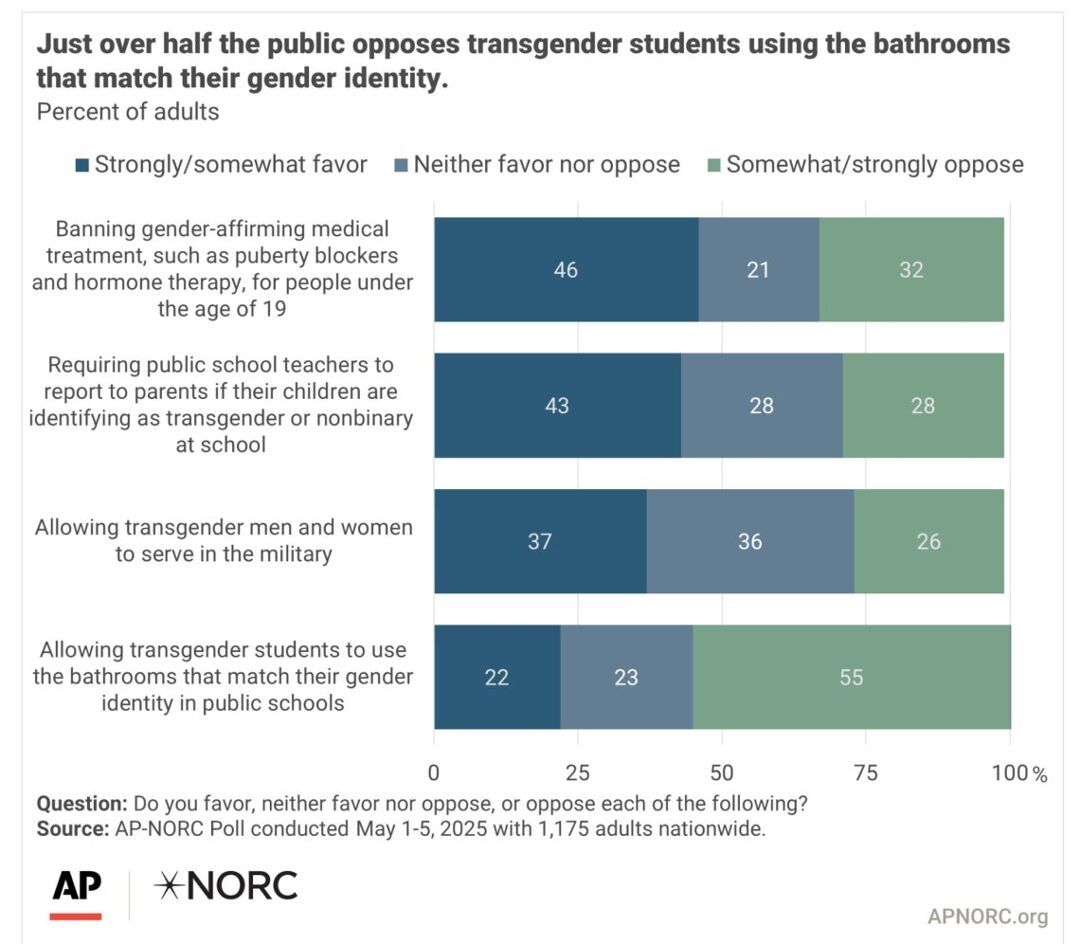
About 52% of Americans approve of President Donald Trump’s handling of transgender issues, according to a new poll by the Associated Press and the NORC Center for Public Affairs Research. While a majority of respondents oppose government funding of gender-affirming medical care for trans people of all ages, a majority do not support removing trans people from the military or schools outing trans and nonbinary students to their parents, the poll found.
The poll asked 1,175 U.S. adults between May 1 and 5 whether they approve of the way
Related
Pete Hegseth hurls vile insult at trans people during keynote speech
People applauded him for insulting trans service members.
While 52% of all respondents approve of Trump’s handling of trans issues, the approval varies widely among different political affiliations. About 90% of Republican respondents approved of his handling, but only 48% of Independents and 19% of Democrats felt the same.
Insights for the LGBTQ+ community
Subscribe to our briefing for insights into how politics impacts the LGBTQ+ community and more.
Subscribe to our Newsletter today
Similarly, 68% of all respondents said that a person’s male or female identity is determined by their biological characteristics at birth. About 89% of Republican respondents agreed with this statement, but only 74% of Independents and 44% of Democrats agreed.
Conversely, 54% of Democrats said that someone can be a man or a woman even if that identity is different from their biological characteristics at birth, but only 22% of Independents and 11% of Republicans agreed.
People who know trans people are less likely to agree with transphobic political views.
The poll found that a majority of respondents across all major political affiliations do not support government funding of gender-affirming medical care for trans people of all ages, though opposition is notably higher for providing this care to trans youth under the age of 19.
When asked if they support government funding of gender-affirming medical care for trans people ages 19 and over — like puberty blockers and hormone replacement therapy — 53% of all respondents said they somewhat or strongly oppose it, but only 30% of Democrats, 45% of independents, and 82% of Republicans said the same.
When asked if they support government funding of gender-affirming medical care for trans people ages 19 and younger, 66% of all respondents said they somewhat or strongly oppose it. 44% of Democrats, 63% of independents, and 89% of Republicans said the same.
The poll also found that 46% of all respondents want to see gender-affirming care for people under the age of 19 banned, no matter who is paying for it.
However, majorities of all respondents either opposed or were indifferent to various social policies regulating trans people’s lives. About 56% of respondents felt this way about policies requiring school teachers to notify parents about their child identifying as trans or nonbinary at school, with only a minority (43%) saying that teachers should be required to out their students. Even more people (73%) either didn’t care about or opposed a ban on trans people in the military. felt this way about forbidding trans people from serving in the military.
But 55% said they oppose allowing trans public school students to use bathrooms matching their gender identity.

Trump has largely vilified trans people as being mentally ill, selfish, dishonorable, dishonest, undisciplined, a threat to women’s sports victories and spaces, and as mutilators of children’s genitals. He has signed executive orders requiring all federal agencies to no longer legally recognize trans people, instructed government-funded groups to remove all trans-inclusive initiatives, taken steps to remove coverage of gender-affirming care from Medicaid and Medicare and to remove trans athletes from girls’ and women’s sports, and recently won the Supreme Court’s approval to remove all trans members from the military.
Personally knowing trans people increases support for trans equality
A June 2023 PRRI survey found that people who know trans people are less likely to agree with transphobic political views. This illustrates a phenomenon known in social science research as “intergroup contact theory.”
The theory states that interpersonal contact with people who are different from oneself leads to more positive attitudes about those people and a decreased belief in negative stereotypes about them, PRRI CEO Melissa Deckman wrote at The Hill.
For example, in the June 2023 survey, 70% of trans respondents and respondents who are personally close to a trans person said they opposed bans on gender-affirming care for trans children. Comparatively, only 52% of cisgender respondents and those who don’t personally know trans people said that they opposed the bans.
In short, the increase in transphobic rhetoric and legislation has been able to thrive because most Americans don’t know actual trans people.
In fact, only 6% to 11% of all respondents in the June 2023 survey said that they have a “close personal relationship” with a trans friend or family member. Comparatively, 40% to 59% of all respondents said that they have a “close personal relationship” with a gay, lesbian, or bisexual friend or family member.
But while the trans community may benefit politically in the long run by building closer relationships with cisgender people, that still presents some challenges. Foremost, some trans people may feel afraid of outing themselves to cis family members, neighbors, and co-workers who may be unsupportive or even hostile to trans individuals.
Also, because only 0.4% of the entire U.S. adult population identifies as trans — compared to the 7.1% of the U.S. adult population that identifies as gay, lesbian, or bisexual — the trans community will need the help of supportive cis allies to help fight transphobic rhetoric and legislation that threatens trans people and their rights.
Subscribe to the LGBTQ Nation newsletter and be the first to know about the latest headlines shaping LGBTQ+ communities worldwide.